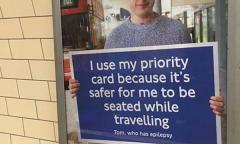#TravelKind - Tom Ryan-Elliot's story
If you travel on the London Underground or across the capital by bus, you may recognise Tom's face. He has been part of Transport for London's Priority Seating Campaign which aims to raise awareness of hidden disabilities on public transport. Tom has been the face of epilepsy. Here he talks about his epilepsy and the difficulties of taking a priority seat when you are a healthy looking young man.
Life before epilepsy
I was diagnosed with epilepsy after a trip out to Las Vegas in 2014. I had been to San Francisco with a group of friends and had a brilliant time. We had done all the usual touristy things and visited Alcatraz. Then we flew to Las Vegas although from that point onwards, I have no recollection of what happened.
Falling down 150 stairs
I've seen pictures of me at a pool party when we first arrived in Las Vegas, so I know I was there. Everyone bets in Las Vegas, so apparently about 20 of us were out betting. I was losing and got annoyed so walked off to my hotel. We think I got lost and went to the wrong hotel but ended up having a drink in an upstairs bar. When I came out of the bar, I fell down 150 steps, cracking my skull.
Life in a coma
I was in a coma for two months. My parents were flown out to Las Vegas because there was a fear I was going to die. After a few weeks, even though I was still unconscious, we were flown back to England and I was sent to Charing Cross Hospital. I was transferred to multiple hospitals and was on lots of medication so didn't have any seizures at that point.
Rushing to recover
After eight or nine months I was allowed home to my parents' house. I was really desperate to get on with my life, get back to work and pretend everything was back to normal. After a few months I was allowed to lower my medications but that was when the seizures started. I was out with my sister and her boyfriend when I had my first simple focal seizure. It only lasted about two minutes but I couldn't talk and started to look a bit odd.
Unable to speak
Now I have a seizure every couple of months. I sometimes also get tonic clonic seizures which can really knock me out. I tend to get aphasia after a seizure and my talking and understanding are not as they should be. Sometimes people think I'm drunk.
Losing touch with friends
Epilepsy has changed my life completely. I can't work and feel I have lost all my friends. When I was working we would always be planning the weekend but now I don't see or talk to the friends I used to work with so at the weekend I just visit my grandparents or aunt. Really I want to be out socialising.
Housemates and epilepsy
Some friends have been good and tried to stay in touch and I have two housemates, so that helps. One of my housemates didn't know anything about epilepsy. His first experience of it was when he came home and found me having a bad seizure in my bedroom. He had to call an ambulance and come with me to the hospital. He stayed with me until I was ok again. I think he understands about epilepsy now.
Discovering photography
Epilepsy has affected my memory. I have to write everything down to make sure I remember it. I use Google notes a lot. Before my accident I would write down important things but I would remember everything else. I'm not working now but I'm doing a photography course and helping out at the Science Museum. They have a Frankenstein Festival coming up and I will be taking some photos.
Problems with public transport
I am lucky that I live in London so get a Freedom Pass to travel on the buses, tubes and trains that come under Transport for London. Generally I'm ok travelling, but sometimes on the buses people ask me to get up if I am sitting in the priority seats. That's the trouble with a hidden disability, especially when you are a young man. Older people in particular ask me to get up and most of the time I do but there are times when, if I think I might have a seizure, it really helps to sit down.
Priority seating campaign
I was really pleased to be asked to be a part of the TfL 'Please offer me a seat' campaign. I went down to Stratford Tube where I was photographed and filmed talking about my experiences with travelling with a hidden disability. I hope it will help to make things better for others.
Don't want to be badged
The campaign is giving people the option of wearing a badge that says 'please offer me a seat.' The badge is a good idea but I imagine some people might prefer to do something more discrete such as a wrist band that says epilepsy.
Man's best friend
Once when I was on the bus, I was sitting in the disabled seats and actually had a seizure. No-one offered me any assistance. I was looking after a dog for someone and the dog was more useful than anyone else. When it realised I was going to have a seizure, it jumped up and started barking at me. Then it looked after me as I started to recover.
Helping people use TFL
Epilepsy featured as part of Transport For London's poster campaign to raise awareness of the priority card scheme encouraging travellers to give up their seat for those with invisible disabilities.
Campaigns
Our campaigns team lobby government and decision-makers on the issues that matter to people with epilepsy. From safer medicines for pregnant women to the dangers of online trolling, and from medicines supply to public transport access, we raise awareness of the daily challenges facing people with epilepsy.


